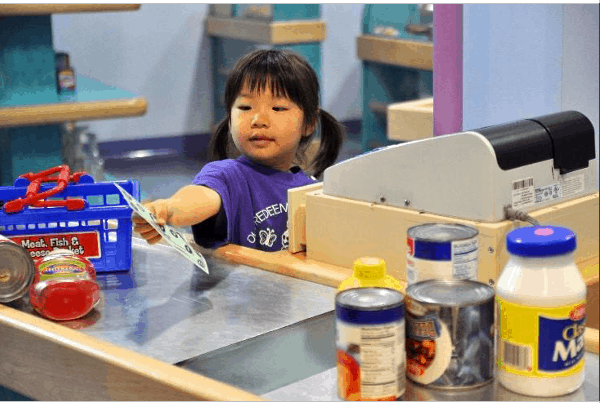Last Updated on April 10, 2018 by ellen
Children learn by doing. Pretend play is an important part of child development. Playing does not just include taking a break after work or study. Pretend play is a form of play where kids can learn through observation. Learning through play is an important part of growing up and a vital contributor to the normal development of children.
Posts may be sponsored. This post contains affiliate links, which means I will make a commission at no extra cost to you should you click through and make a purchase. As an Amazon Associate I earn from qualifying purchases.

Table of Contents
Why Pretend Play is Important for Kids
So, what is the importance of imaginative play for normal child development? Imaginative play combines together different perspectives, ideas, and emotions. Pretend play is considered to be of little educational value but studies confirm that it is essential for social and cognitive development. Throughout the entire process, children are learning to take turns, cooperate, think and solve problems. Here are the reasons why kids should do pretend play. Pretend play may or may not involve toys, and in the case that toys are being used it is best they are not electronic toys as can be found from stores like https://www.goodtoplay.com/
Increased cognitive flexibility
Longitudinal studies have shown that pretend play enhances a child’s capacity for creative performance years later. Imaginative or make-believe play arouse curiosity and enhance learning skills. During the process of pretend play children solve various problems. The skills developed are then used in every aspect of life.
Unlike everyday play activities, pretend play requires communication, social skills, and thinking skills. Kids learn to negotiate, tolerate other people’s perspectives, share ideas, develop a plan of action and symbolize. Children put their imagination to use and think creatively.
Social and emotional development
During pretend play, children adopt roles of different characters and try to manipulate the situation to achieve a common goal. This allows them to experiment with the social and emotional aspects of their lives. They learn who they are as individuals, how the world works, how other people think and what their place in the world is. They learn to be accountable for their actions. Plus, they develop empathy as they learn to manage their emotions and consider other people’s feelings. And, they learn to recognize and respond positively to other people’s feelings.

When they are playing different characters, such as of a princess, colonel, chef, villain, king, queen etc in one play, they learn to negotiate, collaborate, and understand others. Children who actively engage in pretend play are better at empathizing with others because play encourages them to be ‘somebody else.’
Imaginative play develops children’s self-esteem and self-awareness. Kids enjoy make-believe plays because they can be anything that they want. It allows kids to express their emotions, deal with negative emotions and to reduce aggressive tendencies.
Language skills
When children are playing different characters, they come up with different ideas and phrases. Imaginative play allows them to impersonate people from real or fictional world. They learn how language affects others. They learn how to put their points across, to communicate in a way that others understand.
Children can learn new vocabulary according to the different situations that they enact. They learn to choose their words carefully. They listen to what others have to say and learn to communicate in an eloquent manner.
Which of these reasons for encouraging pretend play do you feel is most important?

Ellen is a mom of a 25-year-old son and 30-year-old daughter. She is Grandma to one adorable toddler. In what little spare time she has, she loves to read, watch movies, and check out the latest toys and games.